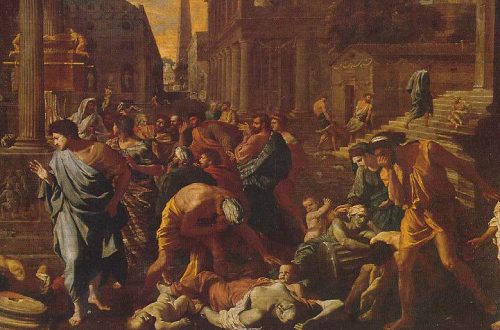We all know Proverbs as a book of wisdom which shares important guidance for Godly living. Many of the proverbs contained with the book are simple and concise: “a slack hand causes poverty, but the hand of the diligent makes rich” (10:4); “Whoever goes about slandering reveals secrets, but he who is trustworthy in spirit keeps things covered” (11:13); “The simple believes everything, but the prudent gives thought to his steps” (14:15). These are typically the ones that stand out in my mind as I try to apply the wisdom of Proverbs to my life. However, even within a book like Proverbs, there are statements that point us to some of the great truths of the Christian faith, foreshadowing the glory of the new covenant to come. One such statement is made in Proverbs chapter 3.
In Proverbs 3:1-4, Solomon is encouraging his son to hold onto the wisdom and teaching which he is passing along. He does this several times throughout the book (e.g. Pro. 4:21; Pro. 6:21), but in 3:3 he encourages his son to put something else in his heart as well: “steadfast love” and “faithfulness” (ESV). The Hebrew words here (chêsêd and ’emeth) are translated in various ways, but they carry the connotation of mercy, kindness, truth, and loyalty. Solomon is encouraging his son not simply to remember information about how life works, but to actually write these attributes on his heart as well – they should become part of who he is.
It is notable that Solomon would focus on these two words. They would have been well known to him as attributes of God himself, coming from the writings of his own father. Consider some of the following Psalms of David:
Psalm 40:11 – “As for you, O Lord, you will not restrain your mercy from me; your steadfast love and your faithfulness will ever preserve me!”
Psalm 57:10 – “For your steadfast love is great to the heavens, your faithfulness to the clouds.”
Psalm 86:15 – “But you, O Lord, are a God merciful and gracious, slow to anger and abounding in steadfast love and faithfulness.”
David was well aware of these attributes of the Lord, in part because he had experienced them so richly. But David would have also been drawing from another source that speaks of these Divine attributes – the Torah. There is an especially enlightening scene in the life of Moses related to these two attributes, seen in Exodus 34:5-7 –
“The Lord descended in the cloud and stood with him there, and proclaimed the name of the Lord. The Lord passed before him and proclaimed, ‘The Lord, the Lord, a God merciful and gracious, slow to anger, and abounding in steadfast love and faithfulness, keeping steadfast love for thousands, forgiving iniquity and transgression and sin, but who will by no means clear the guilty, visiting the iniquity of the fathers on the children and the children’s children, to the third and fourth generation.”
In Exodus 33, Moses requested to experience God’s glory, and God grants him this request, saying only that he cannot see his face. Chapter 34 is the fulfillment of that promise. As God shows his glory to Moses, he proclaims his Name, describing himself in many wonderful terms: merciful, gracious, and slow to anger. Also included in this list, however, are the same words Solomon uses in Proverbs 3 – steadfast love and faithfulness. Like mercy and grace, these attributes are first and foremost attributes of God himself, part of his immutable, self-existent nature.
Thus, when Solomon tells his son to write these attributes on his own heart, what he is really telling his son is to be like God. He is telling his son to look at these key attributes of God – attributes God himself proclaims to Moses on Sinai – and put them on his own heart. As God wrote his words on the tablets of stone on Sinai, so the son should write these attributes of God on the tablets of his own heart.
The problem for the son, and for us, is that our hearts are often hard and deceitful. “The heart is deceitful above all things, and desperately sick; who can understand it?” (Jer. 17:9). We struggle to write the glorious things of God on our hearts with any permanency. Of course, despite this challenge, there are certain things we can and must do. As God told the people of Israel in Deut. 11:18-20:
“You shall therefore lay up these words of mine in your heart and in your soul, and you shall bind them as a sign on your hand, and they shall be as frontlets between your eyes. You shall teach them to your children, talking of them when you are sitting in your house, and when you are walking by the way, and when you lie down, and when you rise. You shall write them on the doorposts of your house and on your gates…”
We must give God’s words and the teachings of Jesus primacy in our lives. We must value God’s written word as a treasure, and see the teachings of Jesus as beautiful gifts to be opened daily. Yet, even as we do this, we, like the people of Israel, will struggle to maintain our focus. Our hearts are weak. Various distractions quickly pluck heavenly things out of them. We need something else, something beyond ourselves that will help anchor them there. Thankfully, God provides for his people, and this is where we see the surpassing beauty of the new covenant which God has given us through Jesus Christ. He does not just give us teaching – he gives us a new heart:
“I will sprinkle clean water on you, and you shall be clean from all your uncleannesses, and from all your idols I will cleanse you. And I will give you a new heart, and a new spirit I will put within you. And I will remove the heart of stone from your flesh and give you a heart of flesh. And I will put my Spirit within you, and cause you to walk in my statutes and be careful to obey my rules.” (Ezekiel 36:25-27)
In the new covenant, ushered in by Christ, God changes our hearts directly. He puts his very Spirit within us, and leads us in obedience. Jeremiah tells us to expect much the same:
“Behold, the days are coming, declares the Lord, when I will make a new covenant with the house of Israel and the house of Judah, not like the covenant that I made with their fathers on the day when I took them by the hand to bring them out of the land of Egypt, my covenant that they broke, though I was their husband, declares the Lord. For this is the covenant I will make with the house of Israel after those days, declares the Lord: I will put my law within them, and I will write it on their hearts. And I will be their God, and they shall be my people. And no longer shall each one teach his neighbor and each his brother, saying, ‘Know the Lord,’ for they shall all know me, from the lease of them to the greatest, declares the Lord. For I will forgive their iniquity, and I will remember their sin no more.”
Notice that both here and in the Ezekiel passage, it is God who does the work. He is the one writing the law on the heart, and even giving a new heart on which to write. That this promise and new covenant refer to Christians is evident by its usage in Hebrews 10:12-18, where the writer explicitly says as much. Not only does the Hebrews writer tell us this refers to us as Christians, but adds, “the Holy spirit also bears witness to us.” In other words, this promise of having God’s law within us, written on our hearts, is the work of the Spirit within us. It is not purely by our efforts, but primarily by the work of God’s Spirit which dwells within us.
The necessity of God’s Spirit within the Christian is clear throughout the New Testament. See, for example, Romans 8:1-11; Gal. 4:6; Eph. 3:16; Tit. 3:5. These verses and more attest to the fact that the Christian life is not simply one of our own effort, but rather it is primarily one of God working on us from within through his Spirit. Even our entry into the Christian family at baptism is not something we do but something done to us by God. There is cooperation, but it us cooperating with God’s work rather than God cooperating with our work (cf. Phil. 2:12-13).
All of this tells us something beautiful about the Christian life and walk. As God wrote his laws on the tablets of stone on Sinai, so he now writes his law on our hearts through his Spirit. He does more still: not only does he write his law on our hearts, but through his Spirit, he changes our very character itself. God does not simply give us new information, but a new heart and a new attitude. He shares with us not only his law, but his heart. This is part of the immeasurable beauty of this new covenant which, by his grace, we are under.
The Lord is, indeed, full of steadfast love and faithfulness. And we, too, should write those attributes on our hearts. We do this, first and foremost, by becoming his children through faith in Christ at baptism, and opening our hearts to his work. It is less that we write on our own hearts, and more that it is written on our hearts by God himself. In response to his work within us, we then hold dear his teachings, and treasure them as precious heirlooms. We store them up within our hearts and bind them around our necks. As we, in this way, participate in the work God is already doing within us through his Spirit, we come to see more clearly that glorious truth: how wonderful is the steadfast love and faithfulness of the Lord!






